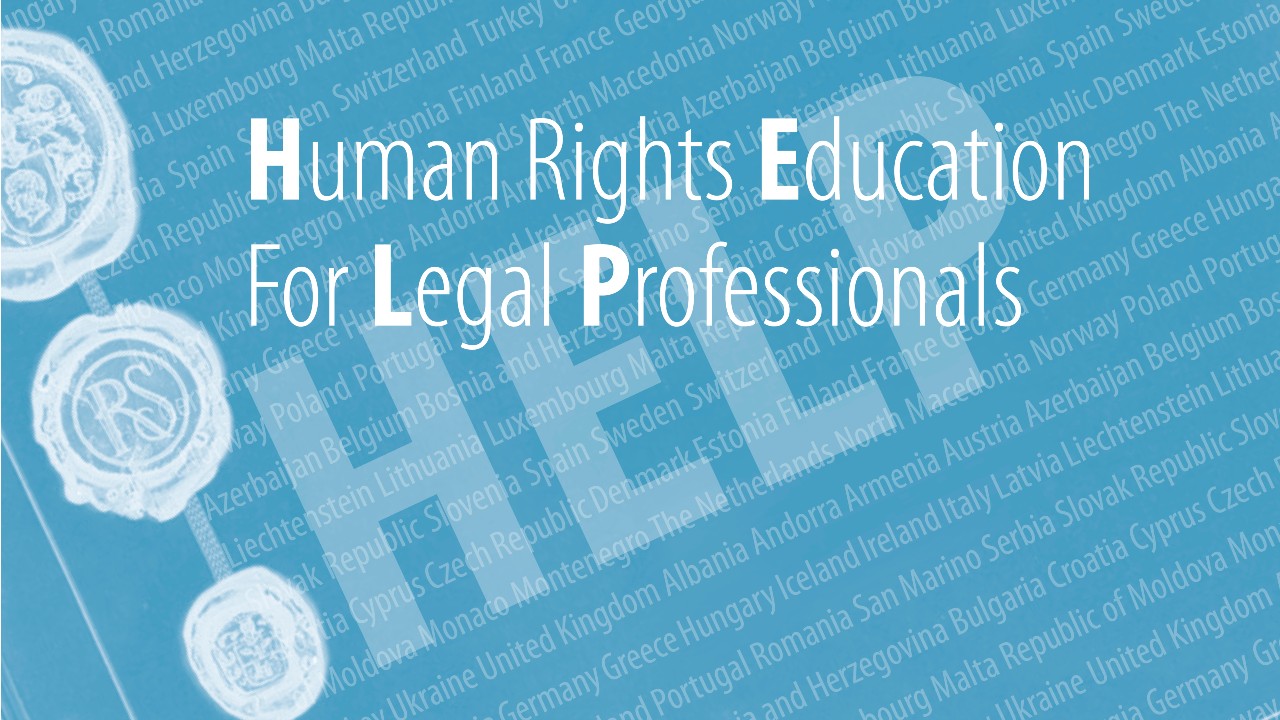Spain prioritises Child-friendly Justice, Violence against Women and Labour Rights as key human rights topics to train judges, prosecutors and lawyers.
The Spanish Judiciary School hosted on 11-12 October 2019 the launch of two HELP courses:
- Child-friendly Justice and Children’s Rights
- Violence against Women and Domestic Violence
The double launch was opened by the School Director Jorge Jimenez, who highlighted the excellent collaboration of his Institution with the Council of Europe HELP Programme, the value of interdisciplinary training, boosted by the good cooperation between by the Spanish Judiciary School, the Bar Council and the General Prosecutor’s Office, and the pro-active role of the HELP focal point, Rafael Bustos. Elsa García-Maltrás, from the Spanish General Prosecutor’s Office, also stressed the excellent cooperation and the will to strengthen the involvement of prosecutors in HELP trainings.
HELP course on Violence against Women and Domestic Violence
Prosecutors Elsa Garcia Maltras and Elena Agüero as co-tutors have prepared the Spanish version of the HELP course on Violence against Women and presented the structure of the course to participants. Tais Deus, a prosecutor detached to the European Court of Human Rights, gave an overview of the relevant jurisprudence.
The HELP course aims at enhancing knowledge on the different forms of Violence against Women and Domestic Violence, the underlying power dynamics and at reflecting on usual perceptions and bias encountered when it comes to violence against women. Professionals will understand key principles of the Istanbul Convention and other International and European standards and will be able to apply a gender sensitive and victim-centred approach in violence against women and domestic violence cases. Finally, professionals will also better understand the responsibilities of civil and criminal law actors and in ensuring an effective state response in those cases.
The course consists of the following seven substantive modules:
- Understanding violence against women and domestic violence
- International and European Legal Framework
- Overcoming barriers / access to Justice
- Criminal Justice Response I – Investigation and pre-trial
- Criminal Justice Response II – Trial and sentencing
- Civil Justice Response
- Alternative Dispute Resolution (if, when and how)
HELP course on Child-friendly Justice and Children’s Rights
The European Convention on Human Rights guarantees the right of any person access to justice and a fair trial, in all its components. This applies equally to children. The Council of Europe has developed many legal standards and practical guidelines including the Guidelines of the Committee of Ministers of the Council of Europe on child-friendly justice, which are a key priority area of the Council of Europe’s Strategy for the Rights of the Child 2016-2021, whose implementation is entrusted to the Ad hoc Committee for the Rights of the Child (CAHENF). Though the course is primarily addressed to legal practitioners, it can be useful for professionals intervening in judicial proceedings or working within the child protection system as well as staff of the Ombudspersons’ offices and NGOs.
The course is composed of 9 modules:
- Introduction: human rights, children’s righs and child-friendly justice; principles and concepts.
- Child-friendly justice: before, during and after judicial procedures.
- Non-judicial proceedings: definitions and reasons; guarantees and conditions.
- General elements: privacy; safeguards/ protection measures; guardianship/legal representation.
- Interaction with children in the judicial system – main challenges: age, gender; status..
- Interdisciplinarity.
- Deprivation of liberty: conditions; reintegration; monitoring and complain mechanisms.
- Violence against children: introduction and legal framework; definition and tyology of violence against children; dealing with victims of violence within the judicial system.
- Migration and asylum: specifi rights of migrant children; unaccompanied children; family reunification; detention and monitoring; administrative proceedings.
Edurne Uranga, Judge in San Sebastian, as tutor of the course guided participants through the Spanish version of the course on CFJ. Among other aspects, she mentioned the advantages of restorative justice. Previously, Concepcion Rodriquez, judge, had made a broader presentation of the work of the Council of Europe in the field of Child-friendly Justice.
Alejandro Saiz, Professor in the Pompeu Fabra University, former Spanish European Court of Human Rights judge at hoc and European Union Agency for Fundamental Rights (FRA) board member, made a historic review of the European institutional architecture (the Council of Europe and then the European Union). “The European Court of Human Rights is the houselight for anybody working for human rights” Saiz said. He underlined that, in spite of the relatively recent teaching of fundamental rights and instruments (e.g. European Convention on Human Rights), European legal professionals have to know and apply the intertwined and often concurrent “three levels of protection” of fundamental rights: Spanish Constitution, European Convention on Human Rights (alongside more than Council of Europe Conventions) and EU law.
Since many of the 60 participants expressed high interest in being enrolled in both courses, this double launch will have a larger impact that initially thought among the judges, lawyers and few representatives from police and Guardia Civil to which the course is addressed to.
HELP course on Labour Rights
Earlier in September, and in collaboration with the Barcelona Bar Council (ICAB), the HELP course on Labour Rights was launched with Jesús Sánchez García and Cristina Vallejo Ros (ICAB’s boarding members).
Former Judge of the European Court of Human Rights, Luis Lopez Guerra brilliantly exposed the work of the Council of Europe, the European Court of Human Rights and how its evolving jurisprudence has contributed to the protection of economic and social rights. While the focus on civil and political rights was understandable in the times of the adoption of the European Convention on Human Rights, the role of the European Social Charter and the Committee on Social and Political Rights must be considered.
Macarena Martínez, Labour Judge in the Catalan Superior Court presented the most relevant ECtHR case law regarding labour rights, as well as its reception in Spain.
The course tutor, Judge Raquel Vicente, explained the content of the national version in a presentation accessible here. Dada la trascendencia de la materia en el curso España, la adaptación nacional incorpora un módulo específico sobre trabajos forzados y esclavitud.
The course consists of the following seven substantive modules:
- Right to work and employment relationship
- Working time
- Fair remuneration and protection of wages
- Termination of employment
- Equality and non-discrimination
- Collective labour rights on all levels
- Occupational safety and health
Eva Pastrana, Head of the Human Rights Education for Legal Professionals (HELP) Programme of the Council of Europe presented both the Programme in general and the above-mentioned courses.
All three courses have been developed by the Council of Europe using its HELP methodology in close cooperation with the relevant entities of the Council of Europe, namely, the Equality and Human Dignity Department, Violence Against Women Division, Council of Europe Children’s Rights Division (for the migration and asylum chapter, the staff of the Council of Europe Special Representative on Migration and Refugees and UNHCR) and the Social Charter Committee.
Following the launch event, all participants were enrolled on the course pages and will go through the online course in the coming 2 to 3 months. The participants who successfully complete the course will receive certificates issued by the national Judiciary School and the Council of Europe.
The fact that the Spanish Judiciary School, the Prosecutors’ Office and the Bar Council bore all financial costs associated to the launch of these courses enables legal professionals to benefit from a larger number of national adaptations of HELP courses.
The Council of Europe HELP courses are intended, in the long term, to become an integral part of the overall learning curricula of the national training institutions and/or other competent authorities of the Council of Europe member states. Embedding HELP courses in the Spanish Judicial School such as “Introduction to the European Convention on Human Rights and the European Court of Human Rights” (compulsory for first-entry judges as of 2018) is exemplary and proves the national commitment to integrate human rights issues into initial and in-service training of legal professionals.
Earlier in September, the Spanish Bar Council (CGAE), as partner of the European Union-Council of Europe funded project “HELP in the EU” had also organised the first cross-border event for the launch of the HELP course on Procedural Safeguards in Criminal Proceedings and Victims’ Rights.
Council of Europe HELP course launch in Spain. © Council of Europe




